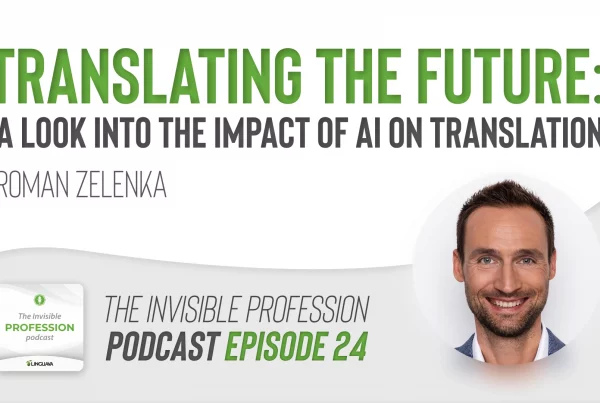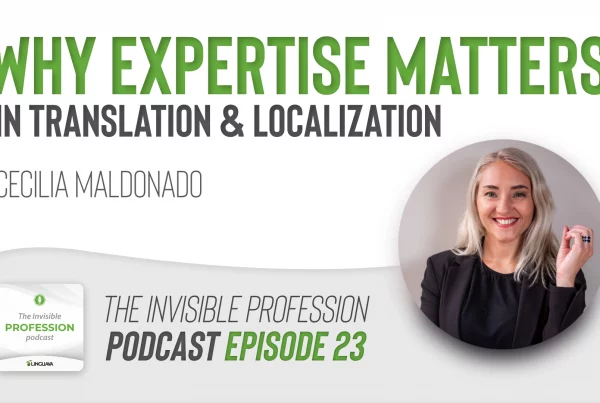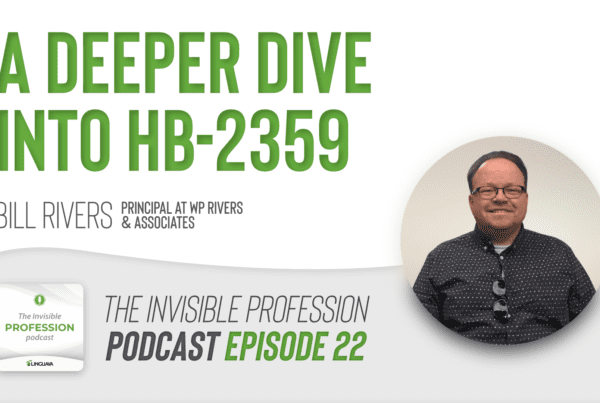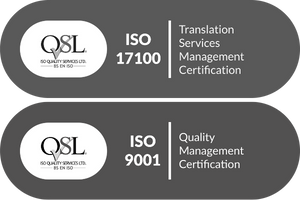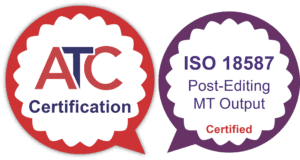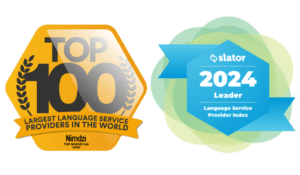NCIHC President Rosanna Balistreri shares why this year’s event is going to be their best one ever and why you should partner with NCIHC. The National Council on Interpreting in Health Care is a multidisciplinary organization whose mission is to promote and enhance language access in health care in the United States. The NCIHC has been a national leader in promoting and enhancing language access in health care since the first meeting of concerned advocates took place in Seattle, Washington in 1994. While the field of medical interpreting has grown exponentially since then, the NCIHC continues to be distinguished for its leadership, quality, and integrity. Listen to our podcast on all your favorite platforms.
Listen to Linguava’s podcast on all your favorite platforms here.
Connect with us on your favorite social site:
LinkedIn | Facebook | Instagram | Twitter
At Linguava, we are dedicated to reducing communication barriers and providing equity to all members of our community through language access services.
If you are interested in learning more about language access or would like to book a training session, contact us today.
Transcript – The Invisible Profession Podcast Ep. 015 with Rosanna Balistreri
Welcome to the Linguava podcast The Invisible Profession. We give you tools, tips, and resources in medical interpretation and translation that help bring to life our profession and ultimately help improve health outcomes with the Limited English proficient and Deaf and Hard of Hearing community.
David: Welcome everyone. Good morning. Checking in here from Los Angeles and I am really excited today. We have a special guest. Her name is Rosanna Balistreri. So am I saying, your, saying your name correctly?
Rosanna: Perfect.
David: Perfect. And just to give you all a little bit of a background on Rosana, she is a dynamic leader in our healthcare interpreter, translator industry.
She has over 25 years of professional background in Translation, interpreting and teaching and training. She’s an experienced trainer, a curriculum developer for Spanish and interpreter programs. She’s been teaching at classes at SDSU CSUF, and she’s also served as the president of the California Health Care Interpreter Association and is presently the president of the National Council on Interpreting in Healthcare, which we’re going to talk a lot about today. She’s also served as the the chair of standards and training committee and the co-chair of Languages of Lesser Diffusion Work. Very exciting to have this conversation with Rosanna.
Thank you so much for joining us today.
Rosanna: Thank you for inviting me to be here today.
David: Excited to have you on the show and your organization has a big event coming up next week. It is the 14th annual membership meeting for the national council on interpreting and healthcare. Tell us about what, what is going down and what is on the on the docket for this.
Rosanna: So this is a two and a half really less than two and a half day event. This is our 14th annual membership meeting that we have and unlike a conference. Really not a conference per se. When you, when we think of the AMM, which is what we use for acronym, we’re so stuck on our lingo. The AMM is really, it’s truly a meeting for our members.
So you have to be a member of NCIHC in order to be able to participate and attend. And we have a very deep topic this year that, you know, oversees the entire event, which is the trauma, language and social justice. And,
David: and you guys chose three really big topics for this year’s event.
Yeah. Tell us walk us through sort of, what was the thought process behind those three topics specifically?
Rosanna: You know, when we think about language and language access is really the focus for the national council. You can’t really separate sometimes these three from one another, you know, the think about the many individuals who come to this country from many different parts of the world, many of them, and most of them, not in happy circumstances, they come with a lot of trauma or they develop a lot of trauma as they try to adjust their life in this country. And they experienced the lack of social justice in the process of integrating and starting a new life. So. The three areas are really not so intertwined between each other. And we thought it would make a perfect theme for our membership event this year.
So that’s how we came up with this topic.
Yeah, no, it definitely does. And I love reading about it. I know you have some really big keynote speakers. This year. Do you want to touch briefly on who you have this year?
Yes, we do have Dr. Anisa Abraham. She will be our keynote on day one, and then we have another keynote on day two well, it’s actually day three because the first day is very brief where we only do a welcoming and we have a a small entertainment session and so networking breakouts. But other than that, the real event will start on Friday the ninth. So only. On the last day of the event, which is Saturday, the 10th, we have our second keynote and her name is Toc Soneoulay-Gillespie, and I hope that I pronounced her name correctly. So those will be two keynotes and we’re looking forward to seeing what they’re going to be sharing with us, with our members. And it’s truly exciting.
David: Yeah, no, that’s excellent Toc’s, actually a good friend of mine and she is a dynamic speaker and presenter.
So I know that she’ll definitely bring it. And it’s going to be a great opportunity to get, to, to hear what she has to share. I’m really looking forward to, to attending tell me a little bit more about. The NCIHC, what is unique about the organization and why should more people come and sign up and become members so they can attend other events like the AMM?
Sure. So the council, which is another way to call NCIHC Is truly an organization of passionate people. And what makes the council is together with this passionate people. We have a lot of committed organizations all of which support, quality interpreting and healthcare access.
Now the fact that we are not. A think tank per se. And yet we do everything possible to promote research in the field of language access together with the fact that even though we’re not a policy organization, and yet we do help organizations produce and develop policies and procedures and ethic and standards for the field.
And we’re also able to do some advocating at the national level but also at the local and regional level and support improvements in interpreting and access to health care. It makes us a very unique organization. It makes us a different many times we are misunderstood as an interpreter association and professional association and we’re not, but that doesn’t mean that medical interpreters should not, or would not have any reasons to join the NCIHC.
In fact, you know, my message to medical interpreters is that they perform a critical role in their daily work and. Speaking to all of you who are interpreters out there. I wanted to always remember that without the extension of your voice, the process of diagnosing and screening and treating a patient cannot be possible in a dignified way.
And so if you are passionate about the work that you do, and even though. And NCIHC is not an interpreter association, your involvement in the discussions that take place around how to continue to advance language access, and social justice for people with language barriers is fundamental. And of course, to any other organization out there who works with racial disparities and marginalized populations and language barriers.
This is really it. The council is the place to be.
And I have to say too from attending many of the trainings, I go to a lot of different trainings with different organizations and the trainings and workshops that the council puts on are state-of-the-art, top-notch very high quality. And it’s a great opportunity.
As a member, you also do. Get a I think, I believe a price reduction as a member for events and trainings and yeah. Looking at the board that you have as well. It’s a really, top-notch, you know, group of leaders in our industry.
Rosanna: Yeah, that is one of the most tangible benefits. Sometimes it’s hard to see where the immediate benefit is for when you join any organization.
And so we’ve tried to really made it as concrete as possible for our members, by giving them the opportunity to the benefit, to access our webinars for free and as part of their members. Yeah.
David: With this big event coming up, it’s your 14th annual what is the main thing or the one or two main things that people are going to walk away with this year after the event?
Rosanna: Oh, lots of questions. They’re going to walk away with more questions than answers. And the reason for that being is that, as I said earlier, the AMM is not the typical conference where you know, you going to presentations and workshops and when. To learn about a particular topic. But this is a national meeting for members to learn that not only about what NCIHC has been working on but be able to have an opportunity to really discuss different topics that may trigger new priorities for NCIHC.
And that is truly that is specifically done with the language access cafes. Where people have an opportunity to discuss a particular topic. And many times for that reason, we leave the AMM with more questions than answers. And that is okay. Because the most important thing is that we got that process of thinking about a specific topic started and everything else is just the must see.
David: Excellent. Now I’m really looking forward to it and I encourage all of you, hopefully are going to be joining as well. If you are a member, make sure that you do show up if you’re not a member yet, I believe that there’s still a couple more days that people could register. Is that right?
Rosanna: Yes. We do have a cutoff date, which is, I believe April 1st. So yes it is tomorrow. Tomorrow is the last day to register. If you haven’t registered, you still have one and a half days. So don’t snooze.
David: Yes. And one more question for you is what is that, that one message that you would love to leave with our medical interpreter community today?
Rosanna: Like I said, you know, the medical interpreter is such a fundamental and critical role for the whole process of the whole platform of healthcare. When. When patients do not share the same language with providers they are that platform without interpreters or without that bridge to communication.
And without that effective communication, I mean, think about it, the whole process of establishing a diagnosis with a patient, understanding symptoms, understanding how those symptoms came about and when and all of those why’s and where’s. And when. They’re all based on communication without communication, those conversations would be completely meaningless.
It would be just like providing a service to the veterinary service. Right. It’s a critical, fundamental rolled out that they hold be passionate about it and know that the difference that you make in everyday and people’s life every day can really make a life and death difference and multiple times.
And so hats off to all of the people that have dedicated their professional life to medical interpreting, you are appreciated, and we are very thankful for the work that you do everyday.
David: Wow. Rosanna, thank you so much. And we, I just want to take a moment as well, just to recognize you for just the countless entire list hours that you have put into the healthcare interpreter and translator industry and just key leadership roles that are helping raise the bar in our industry and take us all to the next level. So thank you for all you do for us as linguists and for the industry at large it’s people like you, that really help bring the change that’s needed. True aspiration for me to to watch and see what you’ve been able to accomplish. So keep going. I know it takes a village, big plans.
Yes, it does. It does. It does take a village lastly, too, for people that do want to learn more about the council. Where should they go show the, go to the website, LinkedIn?
Rosanna: Yes, they can. Absolutely. They can visit us at ncihc.org. And we are in the process of refreshing our website as, so there are new elements for those people who may be coming back to visit the website forum for that, that haven’t visited in some time. They will see some new things. This is still a work in progress. And we look forward to having a more. User-friendly website, but the, all the information is there. People can also reach us at info@ncihc.org for any questions, we are there to assist you and answer any questions that you have.
So we look forward to hearing from you.
David: Excellent. Thank you so much for joining us Rosanna. It was such a pleasure to have you on this show and I hope you have a great rest of your day.
Rosanna: Thank you. Thank you. And a pleasure for me as well.


